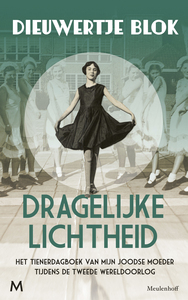Veertien jaar na de dood van haar Joodse moeder vond presentatrice Dieuwertje Blok haar oorlogsdagboek. Met haar debuut Dragelijke lichtheid brengt Blok een warm eerbetoon aan de vrouw die haar het leven schonk.
Een beroep in de spotlights – Dieuwertje Blok heeft het niet van een vreemde. Haar oma Saartje, die als dochter van vishandelaren opgroeide in de Joden Houttuinen in Amsterdam, had grotere dromen dan een baantje als visverkoopster of kousenbreister: zij verlangde naar het podium. Met haar komische talent en mooie stem bouwde ze onder de artiestennaam Stella Fontaine een verdienstelijke carrière op. Geëmancipeerd was ze ook; Stella en haar echtgenoot Sam Gazan hielden het bij één kind, en als zij op tournee ging, liet ze haar dochtertje Hennie voor langere tijd achter bij haar man. Deze Hennie, die na een bezoek aan Engeland haar naam als Henny ging spellen, is de moeder van Dieuwertje Blok en de vrouw om wie het draait in Dragelijke lichtheid. En ook Henny ging het podium op, als zangeres en cabaretière.

Lichtheid, opgewektheid, dat is een kenmerkende eigenschap voor de vrouwelijke lijn in haar familie, blijkt uit het boek van Blok. En wat een zegen, want van de voltallige familie hebben alleen Stella, Sam, Henny en een neef de Tweede Wereldoorlog overleefd; alle ooms en tantes en hun gezinnen werden vermoord in concentratiekampen. Bijzonder dat haar familie nooit aan die zware last onderdoor is gegaan.
Een schat tussen de huisraad
In porties kwamen er na het overlijden van Henny delen van deze geschiedenis naar boven tussen de huisraad. Eerst vonden Dieuwertje en haar zussen een paar langspeelplaten, vervolgens een stapeltje blocnotevelletjes en uiteindelijk, jaren later, een dagboek. Een vondst die ‘voelde als de ontdekking van een grote schat’.
Henny begint haar relaas in 1939, als ze nog 16 is, en het eindigt begin 1942, vlak voordat Stella, Sam en Henny afzonderlijk van elkaar in onderduik gaan. Die oorlog moet toch sporen hebben nagelaten? vraagt Blok zich af voordat ze begint te lezen. Maar tot haar verrassing is het, voordat de oorlog zo nu en dan voorzichtig naar binnen begint te sijpelen, bovenal een normaal tienerdagboek. ‘Het gaat veel over jongens, stomme vriendinnen, boezemvriendinnen, hoe te ontkomen aan het wakende oog van vooral haar vader. Soms denk ik tijdens het lezen: jeetje mama, las je geen kranten, had die dreigende oorlog geen invloed op jou? Dan realiseer ik me dat ze gewoon een meisje van zestien was. Ik schreef op die leeftijd ook over niets anders dan jongens, onbereikbare mannen, vriendinnen en de liefde. Voor mij is zo’n jaartal, 1939, beladen omdat ik de geschiedenis ken, maar voor haar moest die nog geschreven worden.’
Jaar van vrijheid
Voor Henny Gazan was 1939 een jaar van grote vrijheid. Met haar opleiding nam ze het niet zo nauw, met uitgaan en flirten des te meer. Zo vaak ze kon, ging ze dansen in het Lloyd Hotel, waar Joodse vluchtelingen werden gehuisvest. Thuis werden er ook met regelmaat feestjes gegeven. Veel van de dagboeknotities schreef ze midden in de nacht. Inderdaad gaan die vooral over welke jongens zij leuk vindt, welke jongens haar leuk vinden, welke jongens haar vriendinnen leuk vinden, en wie elkaar wel of niet krijgt, of mag krijgen. Op het ene moment is een vriendin een hartsvriendin, op het andere moment haast een vijand.
De oorlog speelt slechts subtiel een rol; naarmate de tijd vordert, wordt er tussen de regels door gesproken over verduisteringen, de toegenomen moeite om een baan te vinden, NSB’ers in de omgeving, en later ook kennissen die vluchten naar Amerika of Engeland. Maar over de oorlog schrijft Henny niet, want ze wil geen ‘bladen volpennen over boten die getorpedeerd worden, menschen die gedood en steden die vernietigd worden’. Een jongen die Henny goed kende, stierf in 1942 in Auschwitz, ontdekte Dieuwertje Blok tijdens haar research.
Door de wirwar aan namen van personen die de lezer weinig zeggen, doet het dagboek soms nogal privé aan. Maar juist het feit dat de oorlog nagenoeg afwezig is, is ook bijzonder. Zelfs in die afgrijselijke tijden won bij veel (jonge) mensen de levenslust het van angst en doemgedachten – hoe mooi en hoopvol is dat?
Gelukkig vermorzelden de vele verschrikkingen tijdens de oorlogsjaren niet bij iedereen de opgewektheid en humor. Henny en haar echtgenoot Dick gaven hun drie dochters een open, verdraagzame, vriendelijke en verantwoordelijke levenshouding mee. Maar vooral: vertrouwen en lichtheid. ‘Ikzelf zie nooit beren op de weg, heb een tomeloos vertrouwen dat alles goed komt en dat als er iets misgaat, het uiteindelijk wordt opgelost,’ schrijft Blok. ‘Het was haar manier van leven en voor mij een cadeau.’
